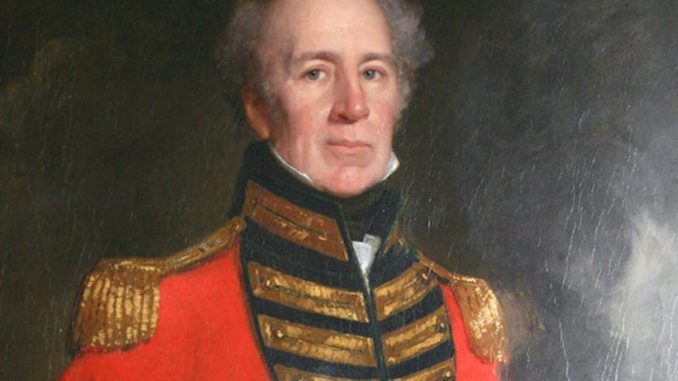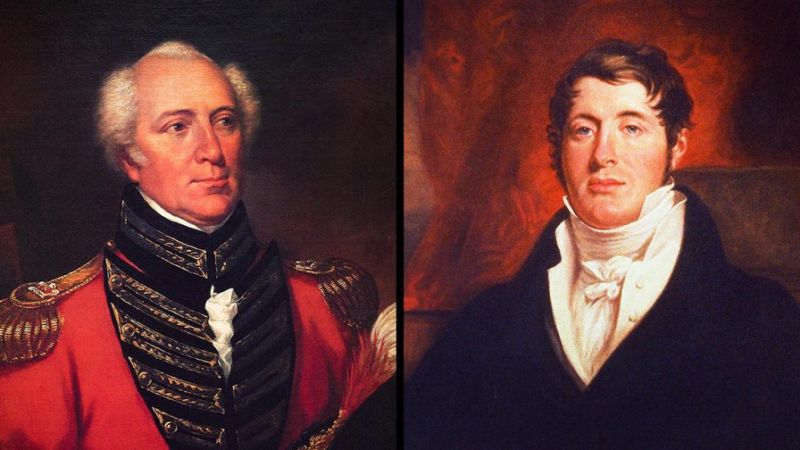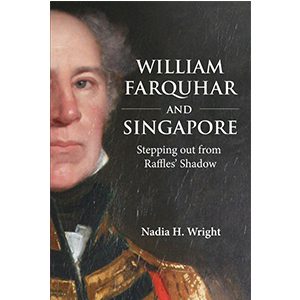
So, like many people, the most fond memory I have of Farquhar is that his name is fun (and funny) to pronounce. His name was always a reliable way to get to say a word that you weren’t allowed to say as a child, although I am sure this information will come back to haunt me some day.
Anyway, I knew Farquhar was Number 2 to Raffles, but the fact that we were taught precious little about him was a subtle reminder that history only remembers the winners, and not the losers or those who come in second-place. But then again, maybe it’s because teachers didn’t want to deal with the hassle of having an entire class of students laughing everything the name “Farquhar” was uttered.

The book “William Farquhar and Singapore: Stepping out from Raffles’ Shadow” came out at a time when I was doing a hefty amount of research (no, I jest, it was mostly from Wikipedia) on Sir Stamford Raffles, thanks to a short film I was doing – “Raffles v Utama: Dawn of Singapore”. More specifically, the following article came up on my radar.
Was Raffles a psycho boss? Melbourne writer Nadia Wright asks in new book
Having had psycho bosses and realising that the namesake of my alma mater might have been one of those psycho bosses was irresistible clickbait. I caved. I wanted to get the book. I wanted it in the name of research, I told myself. And thanks to a good friend who had a good friend working in Kinokuniya, I got a copy of the book.
I’d also like to meet Nadia Wright one day if I can, but I think she might be appalled at my behaviour and language (since I’m far from the polite and cultured paragon of literary genius that this post might make me out to be). Anyway, if not for her efforts, I might have never come upon this book of hilarious missives between Raffles and Farquhar.
In fact, it could even be fictionalised as a passive-aggressive epistolary novel one day. I’d want to read that.

Are you actually going to discuss “William Farquhar and Singapore: Stepping out from Raffles’ Shadow” since this is a book review?
Yes, coming to that now. Very long preamble, but I felt I had to give you some background about it.
What makes this book an entertaining read is seeing just how passive-aggressive (or openly aggressive) Raffles and Farquhar were to each other. It’s almost as if one of them was jilted by the other.
It’s mainly an analysis of what went on during the early years of Singapore, after Raffles founded it, through the letters that various people wrote to each other. Yes, it sounds like it’s a little boring, reading stuffy long-winded British letters between governments and other figures of authority.
But it’s absolutely hilarious.
There’s so much pettiness going on. So much offense is taken. They say virtually everything else except “my feelings are hurt”, but you know this is basically what’s going on (especially when it comes to Farquhar. The poor guy really sounds terribly upset with what Raffles said about him).
It offers a vastly different perspective from the one that you may be used to (or the one that I’ve read, in any case). There’s so much conflict of interest, changing of minds, and ridiculous administrative decisions that you can’t help but nod in agreement. Office politics haven’t changed much since then, except that in the past it played out over a much longer span of time.
The most amusing story was how Raffles virtually ghosted Farquhar by taking a year to reply to his letter. Farquhar was in Singapore while Raffles was somewhere else in the world (I can’t remember where).

However, this being an objective book and all, the implications aren’t so much spelled out as they are… implied. In other words, no potentially defamatory statements or explicit connecting of dots for you. Facts are presented, and you’re left to come to your own conclusions. This can be a little tough at times thanks to the layout, mandating a second read-through of some complicated chapters.
The layout is also not very reader-friendly (walls of text, then several consecutive pages of pictures, before going to back to walls of text again). Granted, this is a historical book and you’d expect it to be very text heavy. However, I felt that interspersing the pictures throughout the book might have helped make it less intimidating to read, though there are cost concerns if the pictures are in colour. Font size is great though.
I’m no historian, but suffice it to say that I made it through the book with some chuckles and a slightly changed perspective. I think as far as history books go, this is one of the more readable ones. If you like to read passive-aggressive British letters at their finest (and learn some choice techniques for insulting others), this is the book for you.
You can buy “William Farquhar and Singapore: Stepping out from Raffles’ Shadow” at Kinokuniya.

This is an original article on marcusgohmarcusgoh.com
Follow Marcus Goh (yes, referring to myself in third person) on Facebook and Instagram for more (presumably) good updates!
I’m a Singapore television scriptwriter who’s written for Lion Mums, Crimewatch, Police & Thief, and Incredible Tales. I’m also a Transformers enthusiast and avid pop culture scholar. You can find me on social media as Optimarcus and on my site.
Send me an email if you want to get in touch!
Thank you for this review. Yesterday, I saw the video of Sang Nila Utama and Raffles that you made, and I found this post today. I’m doing research, too, for a game project of my own, which takes places in early colonial Singapore, and have been researching mainly on Farquhar as he is the one who will predominantly appear in my game. I so happened to be contacted by Dr Nadia Wright, to my surprise, when I clicked on a button to request for a copy of one of her online thesis. I’m also very interested in reading this book written by her.
I want my game to be as historically accurate as possible, so I’ve been doing researching on the two founders right down to the most meticulous detail.
By the way, your video was really funny. I would like to see more similar videos in the future.
Thanks for your kind words, Megan! All the best for your game project – would love to know more about it when it’s out! I assume you’re an indie developer, and it can be challenging sometimes.